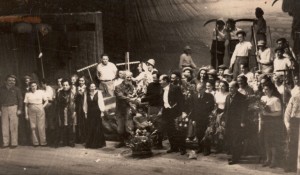
Dan Hashomer (Dan the Guard), Opera
Excerpts from a historical recording of the Opera Dan Hashomer, conducted by Marc Lavry around 1950:
Paulo Gorin, Baritone
Abraham Wilkomirski, Tenor
Shoshana Shoshan, Soprano
Ina Goldenstein, Soprano
Kol Zion Lagola Choir (The Broadcasting Service Choir)
Kol Israel Symphony Orchestra (The Broadcasting Service Orchestra)
Lyrics: S. Shalom / Max Brod
Publisher: The Marc Lavry Heritage Society
Synopsis:
The opera Dan Hashomer (Dan the Guard) was written between the years 1940-1943 and was first performed in 1945 by the Israeli Folk Opera. Marc Lavry was the conductor of the debut performance.
Three of the leading artists of the time came together for the production of this masterpiece: the poet Shin Shalom, the writer Max Brod and the composer-conductor Marc Lavry. The three immigrated to Palestine in the 1920’s-1930’s and joined the Jewish settlement in Israel. Dan the Guard depicted the reality faced by these pioneers in the late 1940’s, during World War II, in Israel.
The opera was directed was Moshe Ha’Levy, choreographed by Gertrud Kraus and designed by painter Yochanan Simon, each one was a leading artist in his field. After approximately 50 performances, the playwrights received an award by the JNF.
Dan the Guard is a Zionist opera that tells the story of the lives and spirits of the pioneers in Israel. The libretto is based on the play Shots at the Kibbutz, which takes place during the days of the first settlements, before the independence of the state of Israel. At the heart of the opera lies a romantic triangle – Dan-Efrat-Nachman. Efrat’s love for Dan stands the trials of Dan’s best friend, Nachman’s, courting. These three Kibbutz members represent typical Zionist pioneers of the era. Along with their friends and family they struggle daily for the continued existence of the Kibbutz, both physically and philosophically, as they get swept away by feelings towards each other. The moving human drama develops on several additional levels: Jewish-Arab relationships; an educational struggle concerning the values of the old world vs. the new world – religion vs. secularity, socialism vs. capitalism; the gap of the generations – the elders who came out of exile vs. their descendants, founders of the Kibbutz and the new Israeli Tsabarim. Finally, there is erotic tension between the genders of the group.
The emotional depth in the description of playwright S. Shalom, combined with the passion present in Marc Lavry’s music, have caught the heart of the Jewish settlement as no other performance had before. The most recognized part of the opera is the chorus that opens the third act – “Ma Milaila BaHanita…”
It is astounding to see how, despite the fact that the opera was written over 60 years ago, the opera Dan the Guard is relevant today. It deals with contemporary issues such as young vs. old, tradition vs. modernism, secular vs. religious, Arabs vs. Jews and emigration.
Anecdote
Lavry was a talented storyteller. It was always a pleasure to listen to his personal stories.
Recently we found a radio interview from the Sixties in which Lavry describes how he wrote the song Hanita. This popular tune later became the famous aria in Lavry’s opera Dan Hashomer (Dan the Guard).
The circumstances of the writing of the song attest to Lavry’s attentiveness to his surroundings and demonstrate his ability to take inspiration from current events.
We are very excited to have found this recording because this is one of the few where Lavry can be heard speaking. We are particularly impressed with his humility and respect to those around him. He was stranded in Hanita and to pass the time he wrote a song for the people with him. Lavry observed the interaction of the audience with the song, and incorporated new sounds, like Eastern trills, in the final version.
Translation:
Lavry: At the end of an opera I conducted in Haifa, the “Old Man”, the famous Yitzhak Sadeh (of the Haganah defense forces), who was in the audience said to me: “you know, Lavry, let’s go for a drive”.
Interviewer: What year was that?
Lavry: It must have been ’37 or ’38, during the “uprisings”.
So we drove. It was quite more than just a short drive, and in the morning we arrived at Lower Hanita in the Galilee. We met a group of soldiers that was getting ready to take over the strategic hill above.Shortly after we arrived gunshots were heard in the distance and we weren’t allowed to turn back. I had nothing to do so I started writing a song. The Old Man gave me lyrics to S. Shalom’s poem “Hanita”. I made it a simple tune, taught it to the men and women in the group, and changed it as we went.
The interesting thing was that every time we sang a phrase, the Arabs on the hill across from us echoed it with an Eastern trill, and Arabic embellishment. We got to a point where we intentionally paused to give them time to reply. It was like a game, and I so much enjoyed it that it remained in my new composition.
Interviewer: Did you feel the need to put this into the composition?
Lavry: Absolutely! The trills remain there to date!
Interviewer: Which performance would you like to hear this time?
Lavry: I think one of the best performers was Paolo Gorin.
Interviewer: Well, we will play it for you with Paolo Gorin.
We unfortunately do not have information about the radio program or the interviewer. If anyone happens to have details, we’d be grateful for the information.
 Dan Hashomer JNF Prize
Dan Hashomer JNF Prize
Palestine Post
November 5, 1945
A gala performance of “Dan, the Guard” was given by the Palestine Folk Opera in Tel Aviv on Saturday night to celebrate the receipt of a special prize from the Jewish National Fund for the first original Hebrew Opera. Mr. A Kamini spoke on behalf of the J.N F. and Mr. M. Chelouche announced on behalf of the Palestine Folk Opera circle a special [£P]50 prize to the composer, Mr. Marc Lavry. Maestro Bernardino Molinari, who was in the audience, was introduced to the performers during the intermission.
Performances
Salute Concert to Marc Lavry
June 17, 2012 8:30PM concert at the Enav Center in Tel-Aviv
The aria Lo Av li Velo Em (I have No Father or Mother) and the aria Hanita will be performed by The Opera Studio Singers of the Israeli Opera












